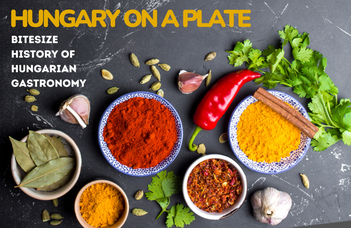Hungary on a Plate: Bite-size History of Hungarian Gastronomy


The course fee for 1-week on-site courses - that includes tuition fee, meals (coffee break and lunch), local transport and the cost of the leisure time programs - is 490 EUR. All applicants are required to pay 90 EUR (out of this 490) as registration fee at registration. The registration fee is non-refundable.
Credits: 3 EC
Our course offers ECTS points, which may be accepted for credit transfer by the participants' home universities. Those who wish to obtain these credits should inquire about the possible transfer at their home institution prior to their enrollment. The International Strategy Office will send a transcript to those who have fulfilled all the necessary course requirements and request one.
Venue: ELTE Faculty of Law, 1053 Budapest, Egyetem tér 1-3, Room A/1
APPLICATION:
Please pay the registration fee and fill out this form: https://www.elte.hu/en/hungarian-gastronomy-bsu2024
COURSE DESCRIPTION
The course will provide an insight into a lesser-known field of Hungarian culture by familiarizing participants with the gastronomic and culinary history of Hungary and the Carpathian Basin. After a brief introduction to food and drink history as well as the most notable turning points in Central European history, we will sample the staples of Hungarian gastro-culture in a chronological as well as a thematic breakdown. We will trace the main culinary characteristics of certain historical periods, highlighting the importance of transfers and exchanges in the emergence of a multicultural cuisine that not only linked Hungary with Central Europe but also reflected global connections. Moreover, we will examine the special place of food and drink in Hungarian literature and culture, with the help of utilizing the diverse methodologies of Food Studies. Therefore, the course will place a great emphasis on the interdisciplinary features of local and regional food and drink history both in theory and practice, incorporating, for instance, visits to notable establishments and markets.
COURSE SCHEDULE
Mon 11.00-12.30: Turning points in Hungarian history: an overview
The course will start with a short introduction to Hungarian history, focusing on the dynamic changes that characterised the everyday lives of people in the region from the time of the arrival of Hungarian tribes (895) to the fall of Communism in 1989.
Mon 13.30- 15.00: A chronology of Hungarian food and drink history
Based on the framework provided in the previous class, we will place together a culinary picture illustrating the diet of people in the region throughout the most important phases of Hungarian history.
Tue 9.00- 10.30: National and regional traditions in multi-cultural Hungarian gastronomy
In order to grasp the richness of Hungarian food and drink culture, we will examine the importance of regional traditions.
Tue 11.00-12.30: Food and identity: ethnic and religious influences
We will focus on the ethnic and religious diversity of the Carpathian basin through the versatility of foods and drinks that have been creating bonds between people for centuries.
Tue 13.30- 15.00: Deconstructing Hungarian cuisine: a transnational history of key ingredients and dishes
Hungarian cuisine is associated with many specific ingredients (such as paprika) and dishes (such as goulash). By studying these, will examine the interconnected histories of the most iconic foods and drinks.
Wed 9.00- 10.30: Visiting a local food market
To put theory into practice, we will visit one of the local markets in Budapest with the purpose of also finding out about the importance of local, seasonable, and sustainable produce.
Wed 11.00-12.30: Culinary and dietary changes under Communism
Together with most of East-Central Europe, Hungary experienced major political and socio-economic changes under Communism throughout the second half of the 20th century. We will invesitgate how these changes translated into the everyday life of people, focusing on their diet and eating habits.
Wed 13.30- 15.00: Tasting menu: food and drink in Hungarian literature
Through sampling the writings of well-known Hungarian writers, we will gain an insight into the importance of food and drink in Hungarian literary culture.
Thu 9.00- 10.30: A Transnational history of chocolate: Hungarian traditions and international connections
Through the case study of chocolate, we will learn about the importance of international connections and transfers. We will explore the richness of chocolate history and the long journey it took from Central America to Hungarian chocolatiers across many borders.
Thu 11.00-12.30: History of Hungarian confectionery
Cakes, cakes, cakes. Nothing could provide as relevant an insight into Hungarian food history as cakes. In this session, we shall find out why.
Thu 13.30- 15.00: Visiting a historical pastry shop
In other words: the proof of the pudding...
Fri 9.00- 10.30: Student presentations
Students will get the chance to choose a topic from the reading list and prepare a short presentation to the rest of the group. As the topics are interconnected, this is meant to facilitate further discussions.
Fri 11.00-12.30: Student presentations
Students will get the chance to choose a topic from the reading list and prepare a short presentation to the rest of the group. As the topics are interconnected, this is meant to facilitate further discussions.
Fri 13.30- 15.00: Visiting the Hungarian Museum of Commerce and Hospitality:
By visiting an exhibition in the Hungarian Museum of Commerce and Hospitality, we will be able to put theory into practice and see the importance of material culture when it comes to culinary history and gastronomy.
